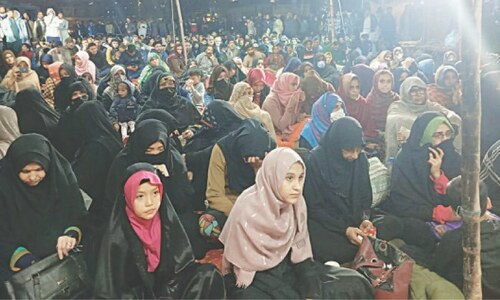JAMSHORO: Working towards many sustainable development goals and addressing water management and climate change challenges, the US-Pakistan Centre for Advanced Studies in Water is doing some essential teaching and research work.
The centre has initially been established at the Mehran University of Engineering and Technology, Jamshoro, through a $12 million cooperative agreement between USAID and MUET. Its six fully functional state-of-the-art laboratories are serving the community, national and international NGOs, public and private organisations including the irrigation department, textile industry, fisheries, sugar industries and so many others.
They are working on climate change, water and food security, flood and drought forecasting, groundwater modelling, soil and water salinity, socio-economic impact, water sanitation and hygiene or WASH, capacity-building and creating a data and information platform.
According to the centre’s director Prof Dr Kamran Ansari, after receiving US funding as a gift from the people of USA through USAID, they were also able to help a lot during the floods of 2022. “We prepared inundation maps of the flooded areas through numerical model and GIS; designed, fabricated and distributed water-saving filters in the flood-affected areas; and provided potable water filtration kits to the people living in the flood-affected areas.
Visits US-funded research, clean energy and water projects in Sindh
It was a pleasant surprise to find so many women participating in all this work. Fiza Mansoor from Hyderabad shared with Dawn a bit about her research. “It has to do with maintaining water quality by treating it and creating conditions and facilities for underdeveloped areas while making the local people aware of the water quality and disease-causing bacteria,” she said, adding that during her Bachelors in microbiology, she herself first became aware of antimicrobial resistant bacteria in our water. She also shared that she has been accepted by the University of Utah. “So I will be going for my PhD there in the fall,” she added.
Sadia Allahditta from Faisalabad said that she was working towards a PhD in integrated water resource management at the centre. “I had done my Bachelors from Agriculture University Faisalabad where I also studied water resource management and learnt about water scarcity issues related to Pakistan. Then I saw this centre’s advertisement and applied here. In 2021, I completed my Masters in integrated water resource management at the centre. I decided to continue my work and am now pursuing my PhD here,” she said.
Tayyaba Sohail from Jhang also completed her Masters from the centre and is now doing her PhD on the hypothesis on water energy food planning in Pakistan and policy-based improvements.
Recently, US Ambassador Donald Blome visited the centre where he discussed partnerships between US and Pakistani universities that strengthen research in water and environment-related fields.
As part of the US-Pakistan ‘Green Alliance’ framework, the United States is working with partners throughout Pakistan to support clean energy and sustainable water management in the country.
Ambassador Blome also visited Jhimpir where there was the USAID-funded power grid station and the US International Development Finance Corporation-funded Hawa Energy Limited wind power project. The plant contributes 50 megawatts of renewable energy to Pakistan’s national grid enough for more than 10,000 homes.
USAID support for power transmission infrastructure has also enabled 780 MW of wind power to flow to Pakistan’s power grid.
He later also visited Thatta and Karachi.
“I’m incredibly pleased to be able to travel through Sindh today and meet with our partners supporting the US-Pakistan ‘Green Alliance’ framework,” said Ambassador Blome.
“This trip is a chance to see and highlight US investment in the region, and how it is focused on supporting Pakistan as it strengthens climate resilience, pursues energy transformation and fosters inclusive economic growth. The ‘Green Alliance’ framework is helping us jointly meet the climate, energy, water, and economic needs of the present and future.”
Ambassador Blome also visited Makli necropolis, one of the largest historic burial grounds in the world. He visited the site with the Sindh culture minister and a representative of the Heritage Foundation to see the results of the $260,000 Ambassadors Fund for Cultural Preservation (AFCP) project to preserve and stabilise the 400-year-old tombs of Sultan Ibrahim and Amir Sultan Muhammad, two of the most prominent structures in Makli.
Over the last 20 years, the AFCP has provided $7.1 million to support 32 projects of conserving, preserving and restoring Pakistan’s rich cultural heritage.
At Karachi, Ambassador Blome toured a US government-funded Unicef project, where he was able to see how a solar-powered reverse osmosis desalination plant, installed at a community mosque, is making a positive difference in the lives of Afghan refugees and Pakistani host community members. He observed mobile nutrition screening and heard how the project is helping children and pregnant and nursing mothers from the surrounding area, which does not have a local health clinic.
He also congratulated recent graduates at the Vocational Training Institute for Women, where the UNHCR, through US funding, supports skills training for Afghan refugee and Pakistani host community women.
He also toured the National Museum of Pakistan, including galleries highlighting sites in Sindh and Balochistan. The visit to the National Museum was an opportunity to show the US appreciation for Pakistan’s history and for the ambassador to learn more about AFCP sites in Karachi’s consular district.
Published in Dawn, May 27TH, 2023















































Dear visitor, the comments section is undergoing an overhaul and will return soon.